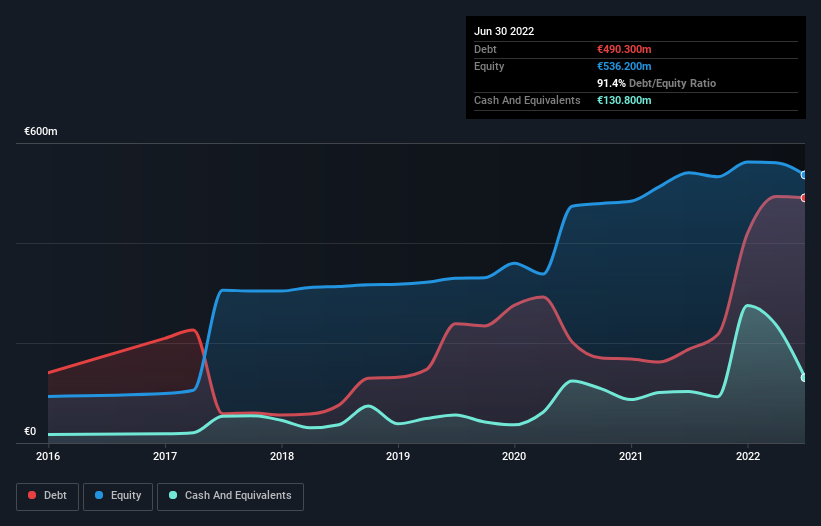
Warren Buffett famously said, 'Volatility is far from synonymous with risk.' It's only natural to consider a company's balance sheet when you examine how risky it is, since debt is often involved when a business collapses. Importantly, Medicover AB (publ) (STO:MCOV B) does carry debt. But the more important question is: how much risk is that debt creating?
When Is Debt A Problem?
Debt and other liabilities become risky for a business when it cannot easily fulfill those obligations, either with free cash flow or by raising capital at an attractive price. If things get really bad, the lenders can take control of the business. While that is not too common, we often do see indebted companies permanently diluting shareholders because lenders force them to raise capital at a distressed price. By replacing dilution, though, debt can be an extremely good tool for businesses that need capital to invest in growth at high rates of return. When we think about a company's use of debt, we first look at cash and debt together.
Check out the opportunities and risks within the SE Healthcare industry.
What Is Medicover's Net Debt?
You can click the graphic below for the historical numbers, but it shows that as of June 2022 Medicover had €490.3m of debt, an increase on €187.3m, over one year. On the flip side, it has €130.8m in cash leading to net debt of about €359.5m.

How Strong Is Medicover's Balance Sheet?
According to the last reported balance sheet, Medicover had liabilities of €409.8m due within 12 months, and liabilities of €843.4m due beyond 12 months. Offsetting these obligations, it had cash of €130.8m as well as receivables valued at €226.9m due within 12 months. So it has liabilities totalling €895.5m more than its cash and near-term receivables, combined.
Medicover has a market capitalization of €1.74b, so it could very likely raise cash to ameliorate its balance sheet, if the need arose. However, it is still worthwhile taking a close look at its ability to pay off debt.
We measure a company's debt load relative to its earnings power by looking at its net debt divided by its earnings before interest, tax, depreciation, and amortization (EBITDA) and by calculating how easily its earnings before interest and tax (EBIT) cover its interest expense (interest cover). This way, we consider both the absolute quantum of the debt, as well as the interest rates paid on it.
Medicover has net debt worth 1.9 times EBITDA, which isn't too much, but its interest cover looks a bit on the low side, with EBIT at only 4.8 times the interest expense. While that doesn't worry us too much, it does suggest the interest payments are somewhat of a burden. The bad news is that Medicover saw its EBIT decline by 20% over the last year. If that sort of decline is not arrested, then the managing its debt will be harder than selling broccoli flavoured ice-cream for a premium. When analysing debt levels, the balance sheet is the obvious place to start. But ultimately the future profitability of the business will decide if Medicover can strengthen its balance sheet over time. So if you want to see what the professionals think, you might find this free report on analyst profit forecasts to be interesting.
Finally, a business needs free cash flow to pay off debt; accounting profits just don't cut it. So the logical step is to look at the proportion of that EBIT that is matched by actual free cash flow. During the last three years, Medicover produced sturdy free cash flow equating to 69% of its EBIT, about what we'd expect. This cold hard cash means it can reduce its debt when it wants to.
Our View
Medicover's EBIT growth rate was a real negative on this analysis, although the other factors we considered cast it in a significantly better light. For example its conversion of EBIT to free cash flow was refreshing. It's also worth noting that Medicover is in the Healthcare industry, which is often considered to be quite defensive. Looking at all the angles mentioned above, it does seem to us that Medicover is a somewhat risky investment as a result of its debt. Not all risk is bad, as it can boost share price returns if it pays off, but this debt risk is worth keeping in mind. The balance sheet is clearly the area to focus on when you are analysing debt. But ultimately, every company can contain risks that exist outside of the balance sheet. For example - Medicover has 2 warning signs we think you should be aware of.
If you're interested in investing in businesses that can grow profits without the burden of debt, then check out this free list of growing businesses that have net cash on the balance sheet.
New: Manage All Your Stock Portfolios in One Place
We've created the ultimate portfolio companion for stock investors, and it's free.
• Connect an unlimited number of Portfolios and see your total in one currency
• Be alerted to new Warning Signs or Risks via email or mobile
• Track the Fair Value of your stocks
Have feedback on this article? Concerned about the content? Get in touch with us directly. Alternatively, email editorial-team (at) simplywallst.com.
This article by Simply Wall St is general in nature. We provide commentary based on historical data and analyst forecasts only using an unbiased methodology and our articles are not intended to be financial advice. It does not constitute a recommendation to buy or sell any stock, and does not take account of your objectives, or your financial situation. We aim to bring you long-term focused analysis driven by fundamental data. Note that our analysis may not factor in the latest price-sensitive company announcements or qualitative material. Simply Wall St has no position in any stocks mentioned.
About OM:MCOV B
Medicover
Provides healthcare and diagnostic services in Poland, Sweden, and internationally.
High growth potential with proven track record.
Similar Companies
Market Insights
Community Narratives



